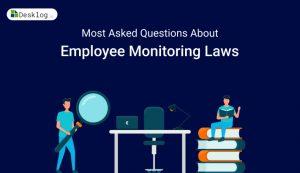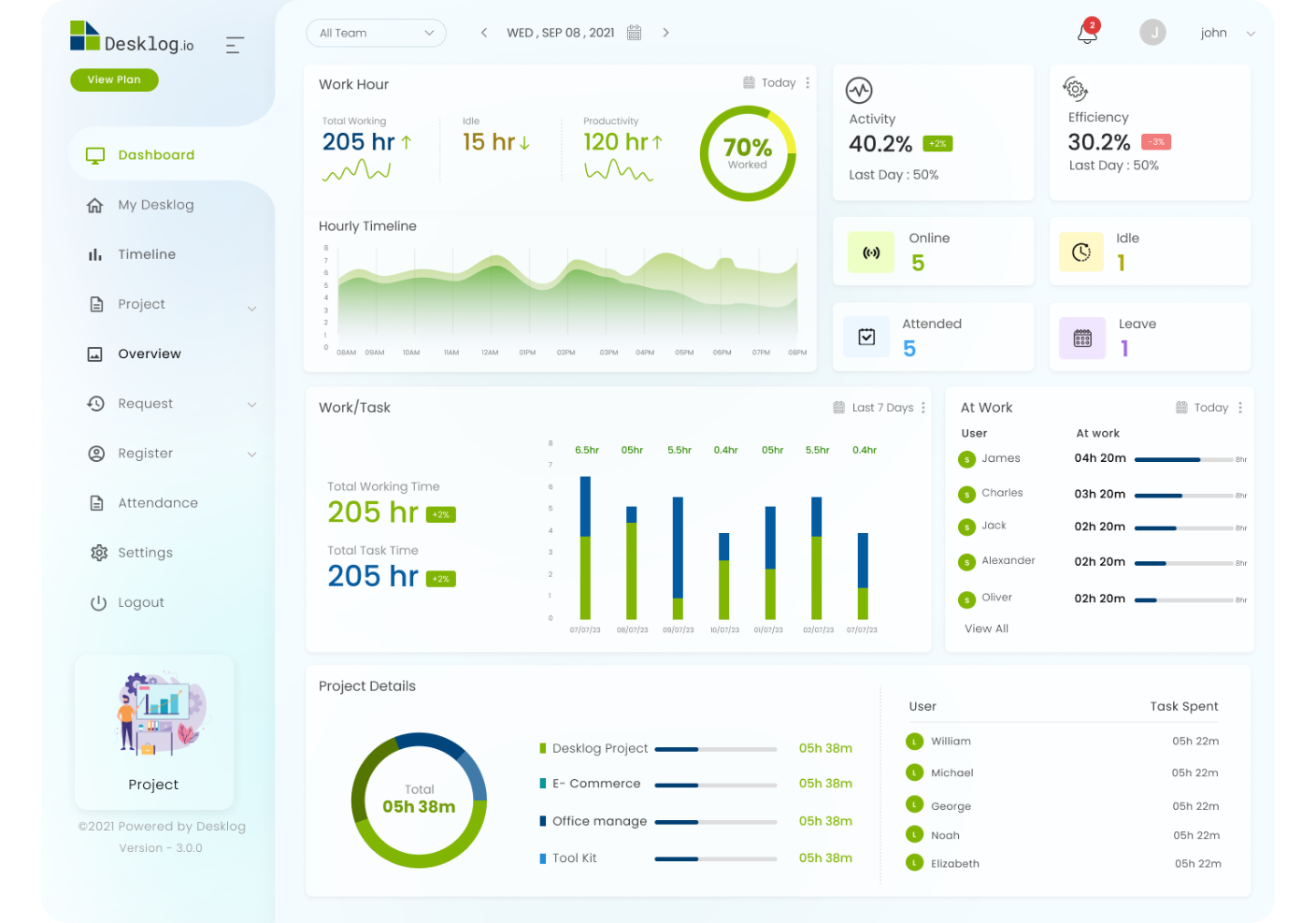
15 Most Asked Questions about Employee Monitoring Laws
Today companies all over the world are using Time Tracking Software. It is proven that tracking time boosts productivity and simplifies the whole management process. Employers and employees alike reap the benefits of deploying time tracking software.
But have you ever thought about the legal aspects of employee tracking?
- Is employee tracking legal?
- What can be legally considered employee tracking?
- Can a company’s computers be tracked legally?
- Can employee internet and social media activities be supervised legally?
- Can screen contents and keystrokes be checked legally?
- Can email content be tracked legally?
- Can phone conversations be recorded legally?
- Can video tracking systems be used legally in the workplace?
- Can employees’ personal devices be tracked legally?
- Is it legally required to notify employees of the tracking?
- Are there employee tracking laws in the USA?
- What are the employee tracking laws in the European Union?
- What are the employee tracking laws in India?
- If employee tracking is legal, can it be considered ethical?
- Is moonlighting policy important in employee tracking?
Let’s have a look at the answers to all these questions. Here are the 15 Most Enquired Questions about Employee tracking Laws.
1. Is employee monitoring legal?
Yes, employee tracking up to a scale is legal in most countries.In most countries, companies have the liberty to keep track of their employees. Some companies have created rules requiring their workers’ permission, and in some companies, employees can even be tracked without asking for consent.
No legal laws required to notify employees are being trackedEmployers require no legal obligations to notify or reveal to their workers that they are under surveillance.
2. What can be legally considered employee tracking ?
Employees are regulated in different ways depending on their nature of work. Any form of surveilling workers and how they work can be considered employee tracking.
Different ways employees can be tracked legallyDepending on the tracking style, it can help protect the company’s assets, ensure rules are followed, boost productivity, etc
Some of the most common methods of employee tracking are:
- CCTV
- Keycards
- Network tracking
- Email tracking
- Call tracking
- Time tracking software
3. Can a company’s computers be tracked legally?
Yes, it is. The law authorizes the employer to track computers owned by the company.According to the Electronic Communications Privacy Act,
- If a company offers a system to their team, it is still considered company property.
- An employer has all the claims to supervise what is done by the team on it. This comprises downloads, files and documents, idle and active time, and internet use.
- And, if any company property is being used remotely, it can be suitably supervised.
4. Can employee internet and social media activities be tracked legally?
Yes. Employees are sometimes required to use the internet and social media for work-related purposes. But, this can lead to employees being distracted and loafing on the internet. The law allows companies to track their employees’ internet activities, such as the time consumed online and sites visited, and restrict certain websites and apps. Many companies deploy social media and internet policies that restrict employees from indulging in any social media or internet activities that are not allowed during office hours.
Lear more about How Desklog Privacy Policy Ensure your Data Security
5. Can screen contents and keystrokes be checked legally?
Yes. In most countries, it is legal for employers to track their team’s screens and keystrokes.If a company has a well-documented workplace policy, then the company can access whatever a worker does on their company systems.
6. Can email content be tracked legally?
Yes! Employers can legally Follow the team’s emails.Any mail sent or received from an office computer comes under the company’s property, and the employer can inspect it anytime.
7. Can phone conversations be recorded legally?
Yes! If they are using an office phone, Companies are authorized to track the use of office systems if there is a valid purpose behind them. However, there are limitations to checking and recording conversations. The ECPA (Electronic communication Privacy Act) outlines that it is unlawful to intentionally intercept any oral, wire, or electronic communication.

8. Can video tracking systems be used legally in the workplace?
Companies can use video tracking systems in the workplace as long as they serve a legitimate business purpose. Nonetheless, federal laws in the United States prohibit their use in certain areas of the workplace. In New York, California, and Virginia, for example, the use of video tracking systems in locker rooms and restrooms is prohibited.
Federal wiretap laws in two-party states specify that audio should not be included in video recordings. Fundamentally, video surveillance is prohibited in areas where people expect privacy. Furthermore, before implementing video recording, the employer must notify employees and obtain their consent.
9. Can employees’ personal devices be tracked legally?
When employees work on personal devices, employers are allowed to track those devices during working hours. Although, the consent of the employee must be received. Also, companies have to define the extent of tracking on personal devices. It is prohibited to access, copy, or download data without the owner’s consent.
10. Is it legally required to notify employees of the tracking?
No! But should notify their employees about the kind and degree of tracking they are under.The team must be protected from misuse of tracking. It is essential to get written consent from them beforehand.
11. Are there employee tracking laws in the USA?
- The Electronic Communications Privacy Act of 1986
- The common law on security against the invasion of privacy,
There is limited workplace tracking in the US to a certain degree. The ECPA has prohibited the voluntary interception of oral, wire, and electronic communication. Some exceptions also apply to this prohibition. One such exception is the Business Motive Exception, which permits employers to observe their employees if done only for genuine business reasons. No federal law in the USA requires managers to inform their team that they are being tracked.
12. What are the employee tracking laws in the European Union?
Things are a lot different in the European Union. The European Court of Human Rights has ruled that employers must give workers notice before tracking their activities. Not only are companies required to notify their teams about tracking, but emails and keystrokes can only be tracked in the existence of a documented agreement.
13. What are the employee tracking laws in India?
According to the Indian Employment and Labour Law, the company has the license to monitor employee activities, work-related emails, SIM cards, and computers. This is to ensure the security of the company’s confidential and sensitive information. If the monitoring carries on beyond company premises, or if it’s perceived to be a breach of employees’ right to privacy, the employer might be required to justify their actions.
14. If employee tracking is legal, can it be considered ethical?
Tracking staff may be legal, but it does not imply that it is ethical.
Employers, of course, can track their team during work hours, especially when they are using company-owned devices. It is something like a parent keeping an eye on their child’ activities to ensure they are safe. Here the employer acts as a guardian of their team’s activities.
After all, it is the right of the managers to be aware of their team’s productivity levels and identify potential areas for improvement. Further, it is also equally important to remember that employees are individuals and it is crucial to treat them with respect and dignity.
Fortunately, there are numerous ways to ensure that employee tracking does not negatively impact morale. With the right tool, employee tracking can be ethical.
When it comes to using a time tracking software, it is required to carefully consider its adherence to legal and ethical standards for surveillance. The chosen tool should aim to enhance employee productivity while respecting their privacy rights, ensuring a balanced approach.
Desklog is a time tracking software that emphasizes ethical tracking and respects the user’s privacy. This software is custom made that focuses on improving their productivity without interfering with their privacy.
15. Is moonlighting policy important in employee tracking?
Moonlighting policy can be an essential tool for employee tracking, depending on the industry, the type of work involved, and the potential risks associated with moonlighting. By providing clear guidelines, restrictions, and consequences, a moonlighting policy can help prevent conflicts of interest, safety concerns, productivity issues, and reputational risks, among others.
Want to try our Time Tracking Software?
Try Desklog for free!

Conclusion
These were the 15 Most Enquired Questions about Employee tracking Laws. The legal aspects of these tracking vary according to country. There should be a balance between the business interests of the company and the employee’s privacy. Both the legal and ethical perspectives of employee tracking are significant.
Deploying time tracking software like Desklog is considered an effective method. Desklog helps maintain a healthy balance between the employer’s business interests and the team’s privacy.

